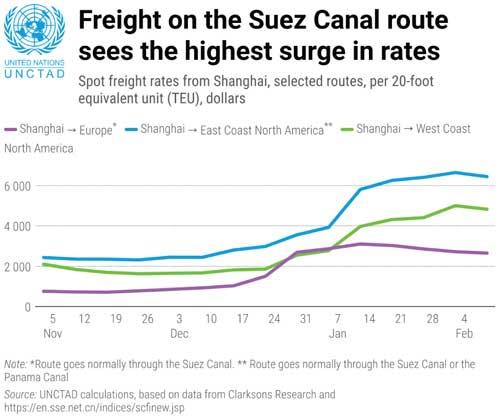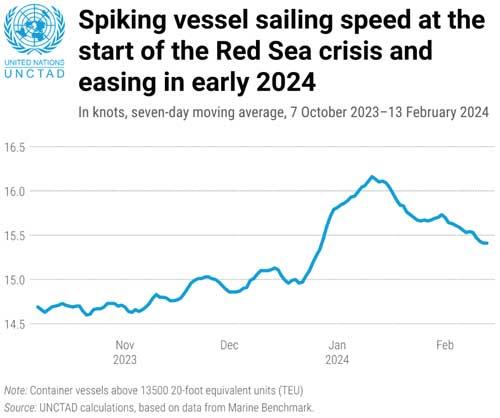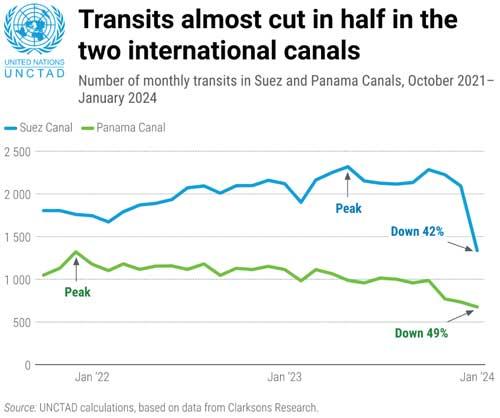26 Feb 2024 - {{hitsCtrl.values.hits}}
The recent attacks on commercial vessels in the Red Sea have severely affected shipping through the Suez Canal, adding to the existing geopolitical and climate-related challenges facing global trade and supply chains, the United Nations Conference on Trade and Development (UNCTAD) says in a new report released on February 22.
adding to the existing geopolitical and climate-related challenges facing global trade and supply chains, the United Nations Conference on Trade and Development (UNCTAD) says in a new report released on February 22.
The Red Sea crisis compounds the ongoing disruptions in the Black Sea, due to the war in Ukraine, which have resulted in shifts in oil and grain trade routes and altered established patterns.
Additionally, the Panama Canal, a critical artery linking the Atlantic and Pacific oceans, is confronting a separate challenge. Dwindling water levels have raised concerns about the long-term resilience of global supply chains, underscoring the fragility of the world’s trade infrastructure.
The UNCTAD estimates that transits passing the Suez Canal decreased by 42 percent compared to its peak. With major players in the shipping industry temporarily suspending Suez transits, weekly container ship transits have fallen by 67 percent and container carrying capacity, tanker transits and gas carriers have experienced significant declines.
Meanwhile, total transits through the Panama Canal plummeted by 49 percent compared to its peak.
Costly uncertainty
Mounting uncertainty and shunning the Suez Canal to reroute around the Cape of Good Hope has both economic and environmental repercussions, particularly for developing economies. Growing significantly since November 2023, the surge in the average container spot freight rates registered the highest-ever weekly increase of US $ 500 in the last week of December. This trend has continued.
Average container shipping spot rates from Shanghai more than doubled since early December (+122 percent), growing more than threefold to Europe (+256 percent) and even above average (+162 percent) to the United States West Coast, despite not going through Suez.
Ships are avoiding the Suez and Panama canals and seeking alternative routes. This combination translates into longer cargo travel distances, rising trade costs and insurance premiums.
Furthermore, greenhouse gas emissions are also growing from having to travel longer distances and at greater speed to compensate for the detours. The Panama Canal is particularly important for the foreign trade of countries on the West Coast of South America. Approximately 26 percent of Ecuador’s trade volumes cross the canal. The share is around 22 percent for both Chile and Peru.
Soaring prices
The UNCTAD underscores the far-reaching economic implications of prolonged disruptions in container shipping, threatening global supply chains and potentially delaying deliveries, causing higher costs and inflation. The full impact of higher freight rates will be felt by consumers within a year.
In addition, practically no liquified natural gas carrying vessels are using the Suez Canal at present. This is directly impacting energy supplies and prices, especially in Europe.
The crisis could also impact global food prices, with longer distances and higher freight rates potentially cascading into increased costs. Disruptions to grain shipments pose risks to global food security, affecting consumers and lowering prices paid to producers.
Climate impact
For more than a decade, the shipping industry has lowered speeds to reduce fuel costs and greenhouse gas emissions. However, disruptions in key trade routes like the Red Sea and Suez Canal, coupled with factors affecting the Panama Canal and Black Sea, are leading to increased vessel speeds to maintain schedules, which have led to higher fuel consumption and greenhouse gas emissions.
The UNCTAD estimates that these factors could result in up to 70 percent rise in greenhouse gas emissions for a Singapore-Rotterdam round trip.
Pressure on developing economies
Developing countries are particularly vulnerable to these disruptions and the UNCTAD remains vigilant in monitoring the evolving situation.
It emphasises the urgent need for swift adaptations from the shipping industry and robust international cooperation to manage the rapid reshaping of global trade. The current challenges underscore the exposure of global trade to geopolitical tensions and climate-related challenges, demanding collective efforts for sustainable solutions, especially in support of countries more vulnerable to these shocks.
30 Nov 2024 1 hours ago
30 Nov 2024 3 hours ago
30 Nov 2024 6 hours ago
30 Nov 2024 7 hours ago
29 Nov 2024 29 Nov 2024